牛津译林版高中英语选修模块七 Unit3 Project 教学设计-新版
牛津译林版高中英语选修七Unit 3 The world online 教案 3
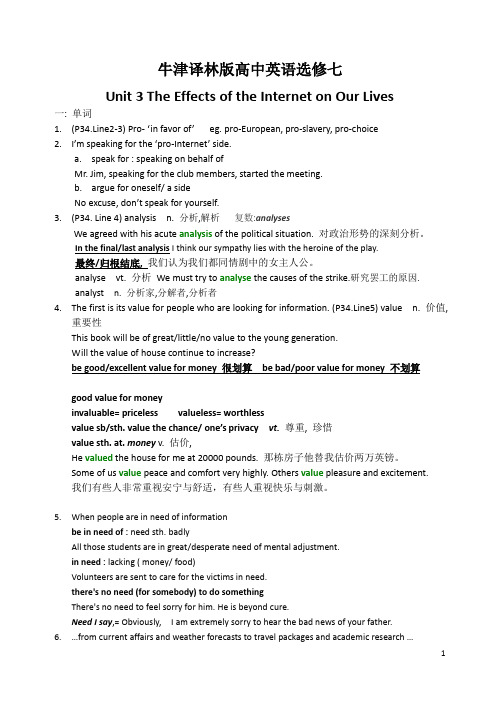
牛津译林版高中英语选修七Unit 3 The Effects of the Internet on Our Lives一: 单词1.(P34.Line2-3) Pro- ‘in favor of’ eg. pro-European, pro-slavery, pro-choice2.I’m speaking for the ‘pro-Internet’ side.a.speak for : speaking on behalf ofMr. Jim, speaking for the club members, started the meeting.b.argue for oneself/ a sideNo excuse, don’t speak for yourself.3.(P34. Line 4) analysis n. 分析,解析复数:analysesWe agreed with his acute analysis of the political situation. 对政治形势的深刻分析。
In the final/last analysis I think our sympathy lies with the heroine of the play.最终/归根结底, 我们认为我们都同情剧中的女主人公。
analyse vt. 分析We must try to analyse the causes of the strike.研究罢工的原因.analyst n. 分析家,分解者,分析者4.The first is its value for people who are looking for information. (P34.Line5) value n. 价值,重要性This book will be of great/little/no value to the young generation.Will the value of house continue to increase?be good/excellent value for money 很划算be bad/poor value for money 不划算good value for moneyinvaluable= priceless valueless= worthlessvalue sb/sth. value the chance/ one’s privacy vt.尊重, 珍惜value sth. at. money v. 估价,He valued the house for me at 20000 pounds. 那栋房子他替我估价两万英镑。
牛津译林版高中英语选修模块七 牛津英语模块七第三单元Grammar教案-新版

牛津英语模块七第三单元Grammar教案Grammar and usageTeaching aims:1.Studentsareexpectedtoreviewtheusageoflinkingverbs,aswellashowtousethem in different situations.2.Students will also learn that linking verbs can be divided into three parts.3.Students will apply what they have learnt to practice by doing some exercise.ProceduresI. Lead-inHelp students to review what we have learnt about linking verbs and what they are.II. Explanation1.连系动词的概念:连系动词是用于将句子的主语与进一步的信息联系在一起的词,而进一步的信息是指主语所处的状态。
2.连系动词可以分成三大类:1.“存在”类:表示存在或具有某种特征或状态。
这类连系动词强调“存在”。
常见的有:be(是),look(看起来),feel(摸上去),seem(似乎是),appear(似乎、显得),prove(证明是),smell(闻起来),taste(尝起来),sound(听起来)等。
例如:The story sounds true.Those oranges taste good.2.“持续”类:表示某种情况或状态的持续。
这类连系动词强调“持续”。
常见的有:remain(依然),keep(保持),stay(保持),continue(继续、仍旧),stand(处于某状况或情形)等。
例如:—Why don't you put the meat in the fridge?—It will stay fresh for several days.It's already ten in the morning. The store remains closed. What's the matter?3.“变化”类:表示由一种情况或状态变化成另一种情况或状态。
译林版高中英语选修7优化教案 Unit 3 Section Ⅴ Project
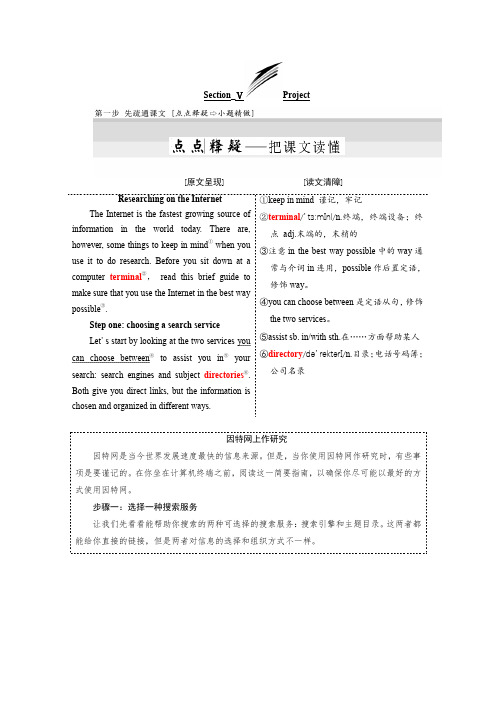
Section_ⅤProject[原文呈现] [读文清障]Researching on the InternetThe Internet is the fastest growing source of information in the world today. There are, however, some things to keep in mind① when you use it to do research. Before you sit down at a computer terminal②,read this brief guide to make sure that you use the Internet in the best way possible③.Step one: choosing a search serviceLet's start by looking at the two services you can choose between④to assist you in⑤your search: search engines and subject directories⑥. Both give you direct links, but the information is chosen and organized in different ways. ①keep in mind 谨记,牢记②terminal/'tɜːm Inl/n.终端,终端设备;终点adj.末端的,末梢的③注意in the best way possible中的way通常与介词in连用,possible作后置定语,修饰way。
④you can choose between是定语从句,修饰the two services。
⑤assist sb. in/with sth.在……方面帮助某人⑥directory/də'rektərI/n.目录;电话号码簿;公司名录因特网上作研究因特网是当今世界发展速度最快的信息来源。
最新高中英语 Unit3 Project教案 牛津译林版选修7.doc
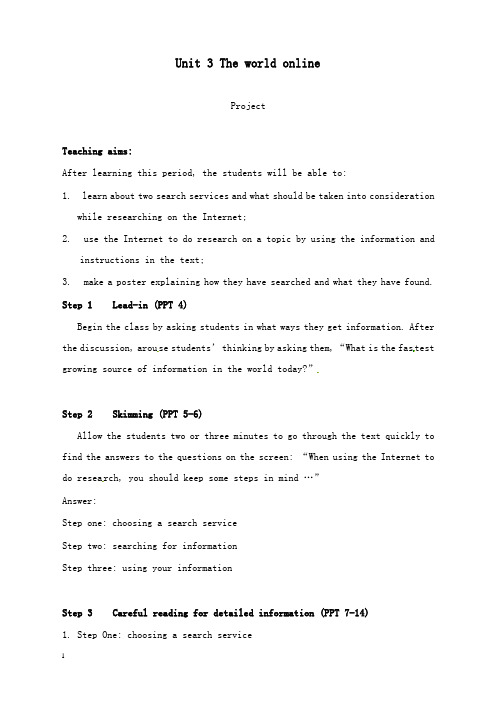
Unit 3 The world onlineProjectTeaching aims:After learning this period, the students will be able to:1. learn about two search services and what should be taken into considerationwhile researching on the Internet;2. use the Internet to do research on a topic by using the information andinstructions in the text;3. make a poster explaining how they have searched and what they have found. Step 1 Lead-in (PPT 4)Begin the class by asking students in what ways they get information. After the discussion, arou se students’ thinking by asking them, “What is the fas test growing source of information in the world today?”Step 2 Skimming (PPT 5-6)Allow the students two or three minutes to go through the text quickly to find the answers to the questions on the screen: “When using the Internet to do research, you should keep some steps in mind …”Answer:Step one: choosing a search serviceStep two: searching for informationStep three: using your informationStep 3 Careful reading for detailed information (PPT 7-14)1. Step One: choosing a search service1)Ask the students the following questions:What are the two search services mentioned in the guide?What do they both give us?Can you set some examples of search engines?Answers:Search engines and subject directories.They both give us direct links.Google, Yahoo, Lycos and Excite.(2)True or false questions:Search engines are a type of computer program.Search engines present evaluated contents because the information has been checked by a person.You need to be patient when using subject directories because the links go to the full articles or pages.The links of the search engines are not classified by subject.Subject directories not only present correct information, but also are up to date.Answers:T F F T F2. Step two: searching for information1)There are several things to take into consideration when you are searching …Answer:Information gets old.People put information on the Internet.The way you type your key words makes a difference.2)Find the right answer:(1)Where will many sites state the date?A. In the middle of the page.B. At the bottom of the page.C. At the front of the page.D. Usually on the right side.(2)According to the passage, why do we usually need to check the source of the information we find?A. Because the date is too old.B. Because we can’t surf on personal web pages.C. Because not every person bothers to read over their own writing and make corrections.D. Because we are afraid of virus.(3)Which of the following web pages is much better for doing research on the Internet?A. Personal web pages.B. Pages managed by organizations and companies you trust.C. Government pages.D. B and C.(4)According to the passage, if you want to learn about swimming but you don’t want any information about swimming, you should type ______.A. sports swimmingB. “sports”- “swimming”C. “sports”+ “swimming”D. sports-swimmingAnswers:BCDB3)Step three: using your informationFill in the blanks:To copy the words just as you found them is not only cheating, but also not legal. So remember to:Write an _______ of the information you have found.Use your own _______ and make your own __________ about what it means.________ a list of the ______ you got your information from.Answers:outline; words; decisions; Attach; sitesStep 4 Language points (PPT15-19)A. Important phrases:1. do research on2. keep in mind3. be classified by4. be linked to5. make a decision6. be divided into7. a bunch of8. up to date9. take into consideration10. as a general rule11. be sure about12. make a difference13. search for14. belong to15. a list of16. follow these tipsB. Key words:1. keep ... in mind (= remember sth. firmly)e.g. It’s a good idea. I will keep it in mind.Translation:你要牢记,你是否努力会影响你的成绩。
牛津译林版高中英语选修七Unit3TheworldonlineWelcometotheunit教学设
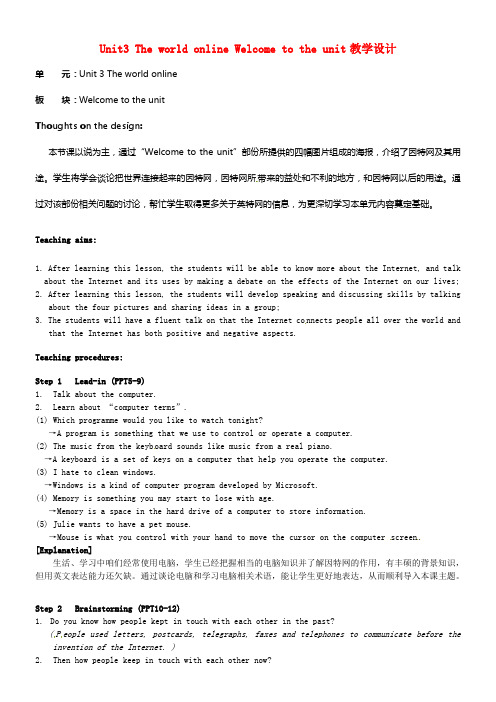
Unit3 The world online Welcome to the unit教学设计单元:Unit 3 The world online板块:Welcome to the unitThoughts on the design:本节课以说为主,通过“Welcome to the unit”部份所提供的四幅图片组成的海报,介绍了因特网及其用途。
学生将学会谈论把世界连接起来的因特网,因特网所带来的益处和不利的地方,和因特网以后的用途。
通过对该部份相关问题的讨论,帮忙学生取得更多关于英特网的信息,为更深切学习本单元内容奠定基础。
Teaching aims:1. After learning this lesson, the students will be able to know more about the Internet, and talkabout the Internet and its uses by making a debate on the effects of the Internet on our lives;2. After learning this lesson, the students will develop speaking and discussing skills by talkingabout the four pictures and sharing ideas in a group;3. The students will have a fluent talk on that the Internet co nnects people all over the world andthat the Internet has both positive and negative aspects.Teaching procedures:Step 1 Lead-in (PPT5-9)1. Talk about the computer.2. Learn about “c omputer terms”.(1) Which programme would you like to watch tonight?→A program is something that we use to control or operate a computer.(2) The music from the keyb oard sounds like music from a real piano.→A keyboard is a set of keys on a computer that help you operate the computer.(3) I hate to clean windows.→Windows is a kind of computer program developed by Microsoft.(4) Memory is something you may start to lose with age.→Memory is a space in the hard drive of a computer to store information.(5) Julie wants to have a pet mouse.→Mouse is what you control with your hand to move the cursor on the computer screen. [Explanation]生活、学习中咱们经常使用电脑,学生已经把握相当的电脑知识并了解因特网的作用,有丰硕的背景知识,但用英文表达能力还欠缺。
高中英语unit3theworldonline-project教案(牛津译林版选修7)

高中英语:unit3 the world online-project教案(牛津译林版选修7)牛津选修七Unit3 Project Giving an oral report教学设计Teaching Aims:l To give students a chance to practice their English by completing a project.l To help students make a poster explaining how they have searched and what they have found.Teaching Procedure:Step One: BrainstormingIn what ways can we get information?Step Two: Reading1) Ask the students to work in pairs to discuss the steps they followwhen they research information on the Internet. Ask them to write downwhat they do step by step. Then ask two or three pairs to present theirways of researching information to the class.2) Read the article in Part A. Get students to underline the key word,phrases or sentences about Internet research given in the article whilereading.Step Three: Safety tipsThere are some very important things that you need to keep in mind whenyou're on your computer at home or at school.•First, remember never to give out personal information such as your name, home address, school name, or telephone number in a chat room or on bulletin boards.Also, never send a picture of yourself to someone you chat with on the computerwithout your parent's permission.•Never write to someone who has made you feel uncomfortable or scared. •Do not meet someone or have them visit you without the permission of your parents.•Tell your parents right away if you read anything on the Internet that makes you feel uncomfortable.•Remember that people online may not be who they say they are. Someone who says that "she" is a "12-year-old girl" could really be an older man.Step Four: Making a poster1) Ask the students to work in groups to discuss the questions in Part B.They should choose a topic to research on the Internet and then dividethe work among the group members.2) Ask each group to present their poster to the class. Other groups cangive their comments. Encourage students to decide which group hadmade the best use of the Internet and has found the true and accurateinformation.Step Five: Important phrases1. do research on2. the more… the more…3. keep in mind4. be based on5. ask for6. right away7. make a decision8. up to dateat the bottom of10. be careful about11. be (not) sure about12. make a difference13. search for14. belong to15. make a list of16. follow these tipsStep Six: Homework: Finish the poster。
牛津译林版高中英语选修七《Unit 3 The world online》Task 教案 3

牛津译林版高中英语选修七Unit 3 The world online Task 教学设计3 Skillsbuildin 1: reading charts and graphsWhen you are learning about a new topic, what information is most important besides opinions?(Facts and figures)Now I’ll present you a chart. Please look at it ca refully and tyr to tell me what this chart can tell us.(The bar chart above shows the weight in kilograms of some fruit sold one day by a market. We can see that 52 kg of apples were sold,40 kg of oranges were sold,and 8 kg of star fruit were sold.)So,when listening,we need to be able to collect facts and figures,which are often presented in the form of charts and graphs. You are expected to learn some different types of graphs and charts that use bars,lines or circles to show information. .Read the guidelines in Skills building 1 on Page 42. Focus on how to understand different kinds of charts and graphs.Step 1: collecting information1. Pair work:Have a discussion with your partner:If you want to attend a series of lectures about the ways people watch or listen to the news,what should you pay special attention to?2. Listen to the first speech and take notes in the space.3. Now,please go over the instructions in Part B and read the three sentences. Try to guess what the speech that you are going to listen to is about and what words will be used to complete these sentences before you listen to the recording.Please check the answers.4. Please read the instructions of Part C. Look at the bar chart and pay special attention to the legend,the side (y-axis) and the bottom (x-axis).5. Please look at the pie chart and read the question and the legend and try to finish the remaining questions.6. Discussion in groups of four. Why 50 per cent of people trust the news sources from national TV and local TV,while only 7 per cent of people trust the news on the Internet.Skills building 2: forming more detailed questions1. What we can do if we want to get more detailed information when we already know a little about a topic?(One of the ways is to ask more questions on this topic.)2. Read the guidelines and the three parts on page 44 and try to understand how to get more detailed information.Step 2: asking more detailed questionsNow,let’s use the skills we just learned to get more detailed information. Suppose you need to ask one speaker his opinion on the situations that people gets news from the Internet. 1. Work individually to think up and write down as many questions as you can to find more detailed information. You can consult the prompts in the left column on page 44.2. Work in pairs,one asks questions formed from the prompts in the left column,and the other answers these questions using the prompts in the right column. After that,I’d like you to present the questions and answers in front of the classroom.Skills building 3: reporting on facts and figuresSometimes we need to write a report on certain topic. What shall we pay attention to when we write a report?For example,when you are asked to write a report on how the students in your class think they should spend their time,what should you include?1. Read the guidelines in this part to find out what are the two main things to focus on.2. Please read Part 1 and try to get how to state facts and opinions. Then try to tell us which of the following are facts and which are opinions.1) Computers are still too expensive for many people. (fact)2) I think reading newspapers is the easiest way to get news. (opinion)3) You can not only see‘real’images on TV but also hear them talk. (fact)4) News on the Internet is updated every hour. (fact)5) Some people consider Internet news to be unbelievable. (opinion)Step 3: e-mail a reportAs mentioned above,you are expected to know how to express facts and opinions. Now,let’s have a practice. Let’s write a report using the informatio n gathered in Steps 1 and 2 and e-mail it.1. First let’s divided into small groups and then make an arrangement. Remember each member of the group should contribute to the planning of the outline of the report. You should pay special attention to in what position you should write the report and to whom you will write the report.2. I’d like several students to read your e-mails to the class.。
英语:Unit 3 Project教案(牛津译林版选修7)
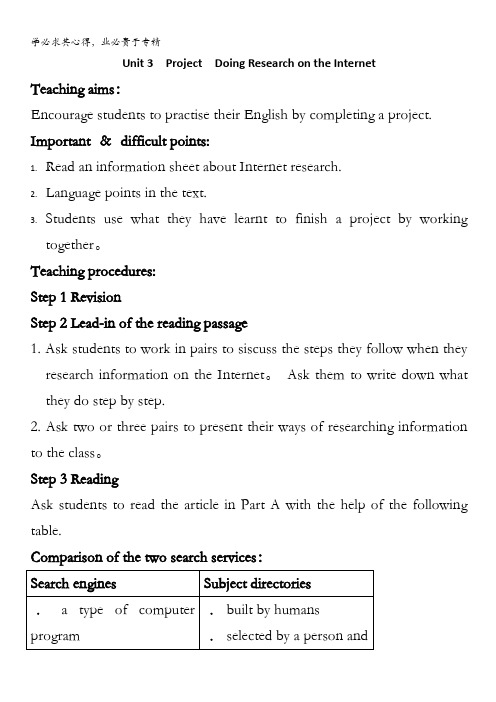
Unit 3 Project Doing Research on the InternetTeaching aims:Encourage students to practise their English by completing a project. Important &difficult points:1.Read an information sheet about Internet research.nguage points in the text.3.Students use what they have learnt to finish a project by working together。
Teaching procedures:Step 1 RevisionStep 2 Lead-in of the reading passage1. Ask students to work in pairs to siscuss the steps they follow when they research information on the Internet。
Ask them to write down what they do step by step.2. Ask two or three pairs to present their ways of researching information to the class。
Step 3 ReadingAsk students to read the article in Part A with the help of the following table.Comparison of the two search services:Step 4 Language points1.guiden.领路人,导游者,引导者,指南a guide book导游指南A guide led us around the city.向导带我们到市内各地去游玩。
- 1、下载文档前请自行甄别文档内容的完整性,平台不提供额外的编辑、内容补充、找答案等附加服务。
- 2、"仅部分预览"的文档,不可在线预览部分如存在完整性等问题,可反馈申请退款(可完整预览的文档不适用该条件!)。
- 3、如文档侵犯您的权益,请联系客服反馈,我们会尽快为您处理(人工客服工作时间:9:00-18:30)。
B. “sports”- “swimming”
C. “sports”+ “swimming”
D. sports-swimming
Answers:
BCDB
2.Translation:
你要牢记,你是否努力会影响你的成绩。
______________________________ _.
情感、态度与价值观
培养学生在特定语境中理解和运用目的语言。帮助学生走出课本,利用已学的知识,用英语创造性地 完成学习任务,培养综合运用语言的能力。
教学
重点
St udents will learn to use some important phrases and key words.
教学
难点
students will be able to learn how touse the Internet to do research on a topicby using the information and instructions in the text
教学
方法
自我展示分 组讨论
教学程序设计
教
学
过
程
及
方
法
环节一明标自学
过程设计
二次备课
Show the learning aims:(明标自学)
Step 1Language points
A. Important phrases:
1. do research on 2. keep in mind 3. be classified by
3.Master some usages and useful phrases
教
学
目
标
知识与能力
1.students will be able to learn how to learn about two search services and what should be taken into consideration while researching on the Internet;
Step2. Searching for information
Step3: using your information
课
后
反
思
You need to be patient when using subject directories be cause the links go to the full articles or pages.
The links of the search engines are not classified by subject.
(3)Which of the following web pages is much better for doing rresearch on the Internet?
A. Personal web pages.
B. Pages managed by organizations and companies you trust.
Answer:
Step one: choosing a search service
Step two: searching for information
Step three: using your information
教
学
过
程
及
方
法环节Leabharlann 合作释疑环节三点拨拓展(备注:合作释疑和点拨拓展可以按照顺序先后进行,也可以根据教学设计交叉进行设计)
What do they both give us?
Can you set some examples of search engines?
Answers:
Search engines and subject directories.
They both give us direct links.
Google, Yahoo, Lycos and Excite.
Subject directories not only present correct information, but also are up to date.
Answers:
T F F T F
2. Step two: searching for information
1)There are several things to take into consideration when you are searching …
教
学
过
程
及
方
法
环节四当堂检测
二次备课
Exercise:
1.Find the right answer:
(1)Where will many sites state the date?
A. In the middle of the page.
B. At the bottom of the page.
C. At the front of t he page.
过程设计
二次备课
合作释疑:
Step 3 Careful reading for detailed information
1. Step One:choosing a search service
(1)Ask the students the following questions:
What are the two search services mentioned in the guide?
D. Usually on the right side.
(2)According to the passage, why do we usually need to check the source of the information we find?
A. Because the date is too old.
Fill in the blanks:
To copy the words just as you found them is not only cheating, but also not legal. So remember to:
Write an _______ of the information you have found.
2.students will be able to understand difficult sentences and learn some key words;
过程与方法
引导学生进行探究式学习,把英语听,说,读,写的训练从课堂内拓展倒课堂外。通过小组讨论,分工合作,信息检索等形式培养学生综合运用语言的能力。
Answer:
Information gets old.
People put information on the Internet.
The way you type your key words makes a difference.
2)Step three: using your information
(2)True or false questions:
Search engines are a type of computer program.
Search engines present evaluated contents because the inf ormation has been checked by a person.
16. follow these tips
B. Key words:
1. keep ... in mind (= remember sth. firmly)
e.g. It’s a good idea. I will keep it in mind.
Step 2 Skimming
Allow the students two or three minutes to go through the text quickly to find the answers to the questions on the screen:“When using the Internet to do research, you should keep some steps in mind …”
C. Government pages.
D. B and C.
(4)According to the passage, if you want to learn about swimming but you don’t want any information about swimming, you should type ______.
4. be linked to 5. make a decision 6. be divided into
7. a bunch of 8. up to date 9. take into consideration
10. as a general rule 11. be sure about 12. make a difference13. search for 14. belong to 15. a list of
B. Because we can’t surf on personal web pages.
C. Because not every person bothers to read over their own writing and make corrections.
D. Because we ar e afraid of virus.
2.The teacher should check what they have learn in this lesson.
